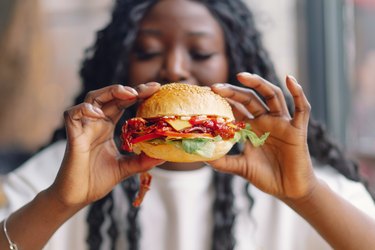
Does your weight fluctuate from one day to the next? The average person can easily gain a few pounds on any given day due to water weight. Certain foods, especially those high in sodium and carbs, only make things worse.
Tip
High-sodium and high-carb foods are often the culprits behind fluid retention. If you want to lose water weight, cut out processed products and limit your daily carb intake.
Video of the Day
Causes of Fluid Retention
Imagine waking up with a puffy face, swollen eyelids and a general feeling of heaviness. You eat a balanced diet and work out regularly and yet, your weight goes up and down. Water weight might be the culprit.
Video of the Day
Also known as fluid retention (or edema), this problem can have a variety of causes, including:
- A high-sodium or high-carb diet
- Hormonal fluctuations
- Prolonged sitting
- Drinking alcohol
- Adding more fiber into your diet
- Sunburn
- Taking certain medications
- Certain health conditions
- Low protein levels in the blood caused by malnutrition, kidney or liver disease
Water retention may also be due to hormonal fluctuations, such as those occurring before your period. According to the Mayo Clinic, most menstruating people experience bloating and gain water weight one to two days (or even five days!) before their period starts.
Sometimes, fluid retention indicates more serious conditions, such as liver or kidney disease, hypothyroidism, lupus, arthritis or heart failure, per the Australian Department of Health.
Malnutrition, kidney disease or liver disease can cause low protein levels, which can lead to water retention, according to Harvard Health Publishing.
Allergic reactions and certain drugs, such as corticosteroids and contraceptives, may contribute to water retention, too.
Foods That Cause Water Retention
In general, high-carb and high-sodium foods have the biggest effect on your fluid retention. If you eat smoked salmon or pasta for dinner, you might hold on to more water weight the next day.
Salty Foods
Salty foods increase thirst, causing you to drink more water — but at the same time, urine volume remains unchanged, according to a June 2017 study in the Annals of Nutrition & Metabolism. So that means your body retains that extra fluid, which leads to (water) weight gain.
A high-sodium diet also contributes to high blood pressure and puts stress on the kidneys, per a June 2014 study in Electrolytes & Blood Pressure.
Water weight gain can be frustrating at the least, especially if you're on a diet. One way to prevent it is to cut back on salt. The American Heart Association (AHA) recommends getting 1,500 milligrams to 2,300 milligrams of sodium per day. The following foods are high in sodium, so they may cause bloating and water retention:
- Cured, smoked or canned meat and fish
- Deli meats
- Bread
- Canned soups
- Canned vegetables
- Pizza
- Savory snacks
- Commercial sauces and salad dressings
- Pickled vegetables
- Sauerkraut
- Noodle mixes
- Cheese spreads and most types of cheese
- Buttermilk
- Prepackaged mixes for pasta, rice and other dishes
- Pastries
- Frozen dinners
- Marinades
- Instant pudding
About 70 percent of our daily salt intake in the U.S. comes from processed and restaurant foods, per the CDC. Fresh fruits, vegetables, nuts and other whole foods have no added salt. They do contain sodium — but a lot less than their processed counterparts.
Smoked salmon, for example, provides 571 milligrams of sodium or 25 percent of your Daily Value (DV) per 3-ounce serving. The same amount of fresh salmon has only 78 milligrams of sodium or 2 percent DV per serving.
High-Carb Foods
High-carb foods may cause water weight gain, too. That's because carbs are converted to glucose and used for energy, and the excess is stored in the muscles and liver.
According to an April 2015 paper in the European Journal of Applied Physiology, the human body retains at least 3 grams of water for every gram of glycogen stored in muscle. That's why it's not uncommon to have puffy eyes and swollen legs after eating pizza, cookies, cakes, lasagna or fries.
A doughnut or a small serving of chips is unlikely to cause bloating and water retention. A large bowl of pasta, on the other hand, will leave you feeling heavy and push the scale up. If you tend to retain water, limit the following high-carb foods in your diet:
- White rice
- Potatoes and potato products (like fries)
- Pasta
- Bagels
- Pastries, cookies and cakes
- White bread
- Ice cream
- Sugary cereal
- Pizza
- Soda
High-carb foods also include whole grains and fruits, which are nutritious and include important vitamins, minerals and other nutrients your body needs. Stick to eating nutritious sources of carbs instead of foods high in added sugars and refined carbohydrates (like in the list above).
Water Retention Remedies
You've cut back on carbs and sodium, but you're still struggling with water weight. Don't give up yet. There are a couple of things you can do to banish the bloat.
First of all, try to get more potassium in your diet. This mineral helps your kidneys flush out excess sodium, which in turn, may help prevent bloating and high blood pressure, per the AHA. Green leafy vegetables, salmon and avocado are foods high in potassium and low in carbs, so include them in your daily menu.
Dandelion tea, fennel, garlic, parsley and other foods that reduce water retention can help too. Fennel, for example, exhibits diuretic and anti-inflammatory properties, increasing the production of urine, per an August 2014 report in BioMed Research International.
Warning
Some herbs and spices may have potential side effects and interact with certain drugs. If you’re under medical treatment, talk to your doctor before using natural diuretics.
- World Action on Salt & Health: Water Retention
- Mayo Clinic: Water Retention, Relieve This Premenstrual Symptom
- Karger: Annals of Nutrition & Metabolism: Relationship Between Sodium Intake and Water Intake: The False and the True
- Springer Link: European Journal of Applied Physiology: Relationship Between Muscle Water and Glycogen Recovery After Prolonged Exercise in the Heat in Humans
- American Heart Association: Shaking the Salt Habit to Lower High Blood Pressure
- Nutritionix: Smoked Salmon
- SELFNutritionData: Cured Beef
- SELFNutritionData: Pan-Fried Pork Bacon
- SELFNutritionData: Cooked White Rice
- Nutritionix: White Potatoes
- Nutritionix: Cooked Pasta
- Nutritionix: Bagel
- Nutritionix: Pie
- Nutritionix: White Bread
- Nutritionix: French Fries
- Nutritionix: Cookies
- Nutritionix: Ice Cream
- T-Nation: Shredded in 6 Days
- SagePub: Nephrology @ Point of Care: Diuretic Plants Cited in the “Moretum” Poem From the Appendix Vergiliana


